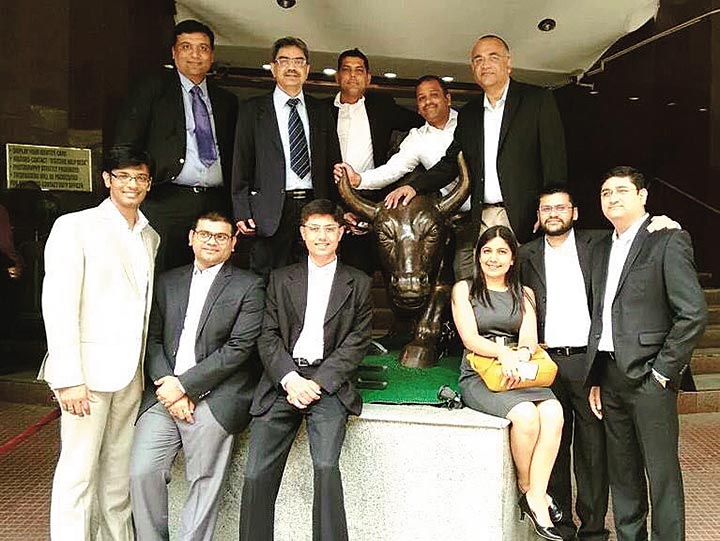Neeru Sharma’s daughter was four-years-old when she asked her mom what she did for a living. She was too young to understand that her mother had co-founded the e-commerce marketplace, Infibeam, so Sharma showed her the e-tailing website, which carries the tagline, ‘Shop with a smile’. The little one then wanted to order an iPad from the website and Sharma agreed to buy it for her but only on the condition that she would have access to it only during her travel time and holidays. A couple of days later, the four year old, all smiles and giggles, told Sharma, “Now I know what you do. You make smiles.”
It’s difficult to spot the 37-year-old Neeru Sharma without a smile. Almost every sentence ends with a laugh, her words ooze passion, energy and positivity. Today she is the director of platform business service at Infibeam, the first Indian online retailer to go public and one of the few e-commerce start-ups that are profitable. Its FY17 revenue stood at Rs.440 crore with a profit of Rs.44 crore.
Humble beginnings
Sharma hails from a middle class family in New Delhi. Her father, an HR professional, tried his hand at being an entrepreneur, but that resulted in losses, which prompted her mother to step up and handle their small autolamps plant while her father looked for a job. Meanwhile, the responsibility of taking care of the household fell on Neeru, although she continued to do well in studies.
In 1997, she joined Maharshi Dayanand University, Rohtak to pursue computer science and engineering. It was here that Sharma met her best friend who would later become her husband. When she graduated in 2001 post the dotcom bust, the IT industry was in a slump and TCS was the only company that came to her college for recruitment. Luckily for her she managed to get a job there, and worked for over two years before moving on to Alcatel.
At Alcatel, Sharma was exposed to the business side of things. A popular reality show had introduced tele-voting for the first time in Indian television history, and this was enabled by Alcatel. Sharma, as the product manager, had the chance to interact with the show’s marketing team. This is where she learnt that technology was mostly an enabler of business, but building a business was just something else — it required vision and strategy.

She got married in 2005, and wanted to start a business together with her husband. But they decide to pursue an MBA first. So, whereas other newlyweds would have preferred to go off honeymooning post marriage, Sharma and her husband were preparing for their GMAT. Both were accepted into Carnegie Mellon University. With an MBA in finance and strategy, Sharma worked directly with Jeff Bezos at Amazon. One of her team members was Vishal Mehta, now CEO at Infibeam. The team’s job was to evaluate the e-commerce market in India, something that was at a nascent stage then. Flipkart had just started out; neither Rediff nor IndiaMart, both in the market, was a full-blown e-commerce player. They realised the space was wide open for new entrants. Hence Mehta returned to India in 2007 and Sharma in 2009 to found Infibeam.
Already amused by Sharma’s decision to pursue an MBA right after marriage, her mother was now downright worried about her returning back to India, leaving a job in the US with Amazon no less, to start something from scratch. It was only after Infibeam clocked their first couple of orders that Sharma’s mother realised that her daughter was on to something bigger. “My father-in-law was very supportive. Being a businessman himself it was easier for him to understand what I was trying to accomplish, and was a good friend to me at home,” says Sharma. Her joint family provided a fantastic support system for her.
While Infibeam was headquartered in Ahmedabad, Sharma operated out of a small apartment office in Daryaganj, New Delhi, an area famous for books and publishing companies. She went from vendor to vendor and publisher to publisher, pitching Infibeam and explaining the digital side of the story to them. “I remember having to use my Amazon and CMU connections to secure meetings with publishers, because nobody knew Infibeam then, we had just startedafter all,” she says.
Sharma had to educate people across the supply chain on the prospects of the e-commerce platform. Frequently, she would come across comments such as: “You look too young to start a business.” People judged her even before interacting with her. But Sharma stamped out prejudices with her company’s clear strategy and plans to scale up the business.
After starting with books, Infibeam slowly moved on to electronics and other categories. Retailers and brands that wanted a piece of the e-commerce pie but didn’t have the technical expertise to set up something on their own started showing a lot of interest in coming onboard. “We understood that everybody was looking for a partner in the e-commerce space who could later build an online channel for them,” Sharma notes. So, she and her team created a B2B platform, which enabled brands to have an online presence. Their first client, Crossword still runs on the platform hosted by Infibeam. Airtel was the first telecom platform partner, and clients from sectors such as travel and ticketing and theme parks soon followed thereafter. The company inked a joint venture with Sony for Jive, their digital music application that was being pre-installed in devices such as Sony Xperia mobiles and Sony Vaio laptops. The platform piece then went international. It opened its offices in Dubai and received clients from across the world. Its latest clientele includes Amul and GeM (Government e-market), Orient Electric, Daikin, Panasonic, Spykar, Saudi Telecom Company and GVK Mumbai Airport. The company also launched Pi, the first Indian e-book reader before Kindle reached India, and was also one of the first players to sell iPhones in India.

Sharma has her own cabin, which is where she is seen the least, preferring instead to sit among her team members. She counts herself blessed not to have encountered the problems that many women face at work despite being the only woman as part of the core team. So whom does she credit for inspiring her? Jeff Bezos, Sheryl Sandberg, Jack Ma and Raghuram Rajan when it comes to work, she tells me, but in personal life her source of inspiration are her mother and her six-year-old and nine-year-old, who she believes give her fresh perspective.
But natural, Sharma has her crazy schedule with a lot of travel, but she makes sure that she is with her family on weekends. She also tutors her children herself and spends time with them every day as long as she is not travelling. A family outing is a weekly affair, and a yearly vacation trip in June when the schools are closed, mandatory. “My family rejuvenates me,” declares the mother of two. A Level 2 Kathak dancer, she finds time for running, sketching and reading.
Staying ahead
The e-commerce landscape is going through tumultuous times with even biggies like Snapdeal struggling to stay afloat. But Sharma is unfazed. Infibeam differentiates itself from other e-commerce players with its B2B e-commerce enabler platform, BuildaBazaar provides a comprehensive e-commerce framework, which include web and mobile applications, digital product catalogues and analytics. “It is a unique value proposition for merchants, both local and global, to use our platform and set up an online marketplace instantly with ready-to-sell products at an affordable cost. The scalability of business is very high, which helps Infibeam acquire merchants without losing money and thereby growing revenue from services, remaining profitable and cash positive,” Sharma notes. In 2016, Infibeam became profitable and registered for an IPO from which it garnered Rs.450 crore.
Today, Infibeam has around 1,000 employees. “Challenges excite me,” smiles Sharma. “And I want to build things. Ten to twenty years down the line, you will still see me building something.” She admits that competition has been increasing, but points out that it also helps increase the market size. “Innovation is the key to survive when the market dynamics keep changing,” she remarks. She believes that her commitment to deliver the best to the end-customer, ability to manage time and a never-give-up attitude have helped her to not lose her grip on things during trying times.
She has managed to smile at the worst of times and believes they all happen for a reason. I point out that she hasn’t stopped smiling from the moment we met and she says laughing, “I’m always like this — it really takes something to pull me down!”











